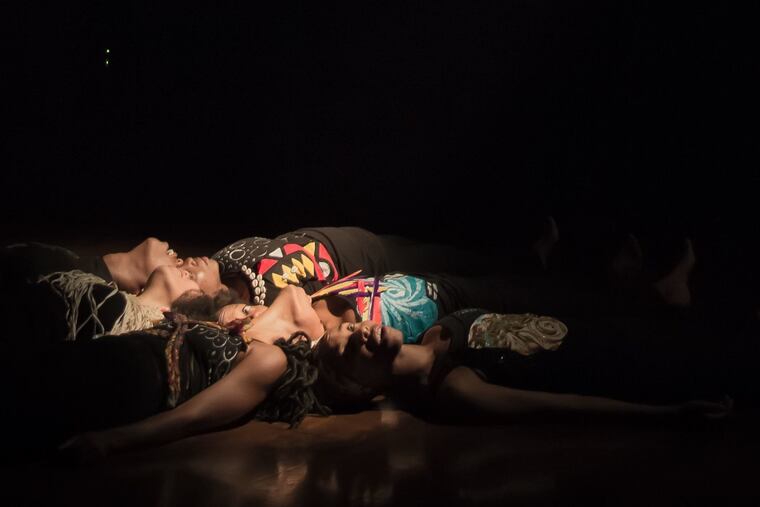'Vessels’ at Annenberg brings the horrors and the sisterhood of the Middle Passage to the stage
Through song and movement, "we’re asking people to move through the darkness with us and find the light inside of it,” says one of the show's producers.

Like any theatrical producers on the eve of a new production, Rebecca Mwase and Ron Ragin were eagerly looking forward to the world premiere of their provocative show Vessels when I met with them last week in a Fairmount coffee shop.
But this wasn’t just the usual anticipation of finally getting a new show in front of an audience. In this case, it also meant the end of a four-year deep dive into often disturbing subject matter.
“I’m excited for this work to be out in the world so that I don’t have to read about slavery and the Middle Passage all the time,” Ragin joked darkly. “It can be a little heavy, to say the least.”
Opening on Thursday and continuing through the weekend at the Annenberg Center, Vessels draws not only on an extensive reading list but also on travels Mwase and Ragin took to Zimbabwe, Senegal, Benin, and Ghana, as well as to U.S. port cities involved in the slave trade.
Despite the horrific nature of the topic, however, the pair insist the show isn’t unrelentingly bleak.
“It’s important to say that this is not ‘The Middle Passage: The Musical,’ " Ragin said. “Most people will probably have some sense of the Middle Passage as a lot of terror and violence and discomfort.
"We’ve attempted to honor the truth of that, but also not feel constrained to only represent that. We wanted to fully flesh out what the experience might have been like, to find where there was joy, how people took care of each other, where there was comfort or loving touch.”
The inspiration for Vessels came from a talk by poet Nikki Giovanni, who pondered how millions of enslaved people arrived on these shores with their sanity intact. The first thought that leaped into Mwase’s mind was “song,” and she set out to investigate how singing offered at least a spiritual escape from suffering.
Mwase, a Zimbabwean American theater and performance artist, immediately called Ragin, a singer and composer focused on interdisciplinary work and the music of the African diaspora.
The pair conducted a series of workshops centered on the question “What does freedom sound like in a space of confinement?”
In Africa, they studied traditional songs and dances related to important moments in women’s lives – birth, death, menstruation, marriage, and war. In the U.S., they visited currently and formerly incarcerated peopled to explore the contemporary parallels. The result was the show that opens this weekend, which depicts the Middle Passage through song and movement performed by seven women in an interactive, sculptural environment.
“When you think about the trajectory of Africans in the Americas,” Mwase said, “song is a way to transcend your body, song is a way to enter your body, song is a way to give someone a message. As all of these people from different tribes and ethnicities and family groups got shoved into this one place. How could they communicate to each other?
"African folks have traditions, rituals, and practices that are rooted in song and dance as a way to maintain a spiritual connection, so the ships became a crucible for the creation of blackness.”
Mwase and Ragin refer to Vessels as a work of “speculative history.” It’s not an attempt to tell the true story of the experience of the Middle Passage — the leg of the triangular slave trade that brought enslaved people to the New World — but rather an imaginative depiction inspired by research.
In part, that’s a necessity due to the gaps in and unreliability of the historical record when it comes to enslaved people. The piece muses on the ambiguity of the title: vessels in the literal sense of slave ships, but also human bodies as vessels for the soul — and song as a vessel for spiritual expression.
“We call this a ritual performance,” Mwase said, “in part to honor its spiritual connections and its reverence for ancestors, in part because it’s interactive and people will be engaged in making the work with us.
"We’re asking people to go on a mysterious journey, to move through the darkness with us and find the light inside of it.”
ON STAGE
Vessels
Performances March 7-10 at the Annenberg Center, 3680 Walnut St., $19-$35, 215-898-3900, AnnenbergCenter.org